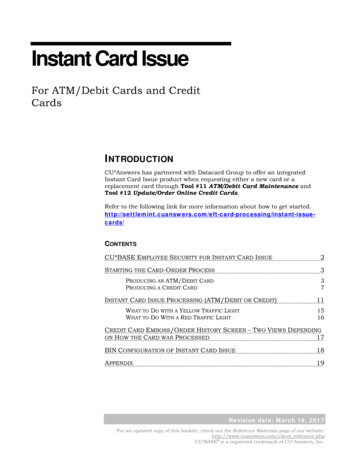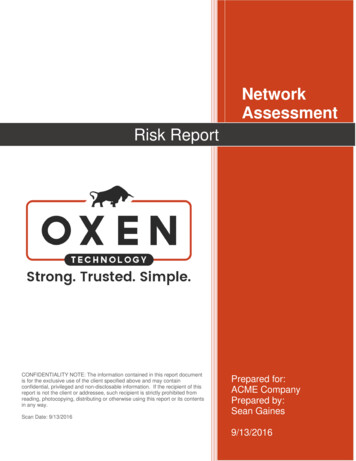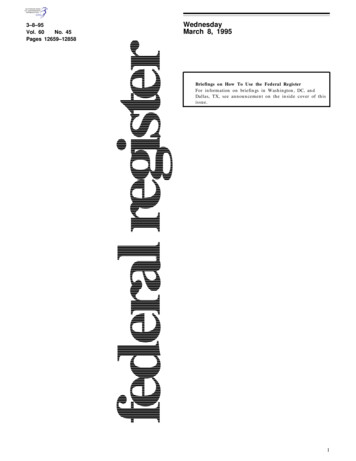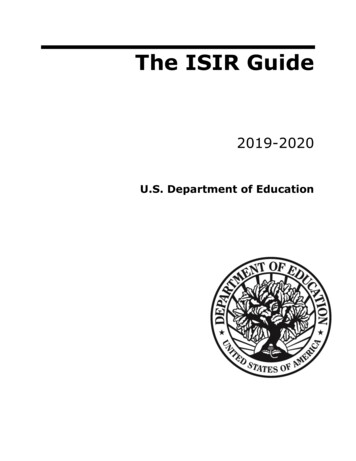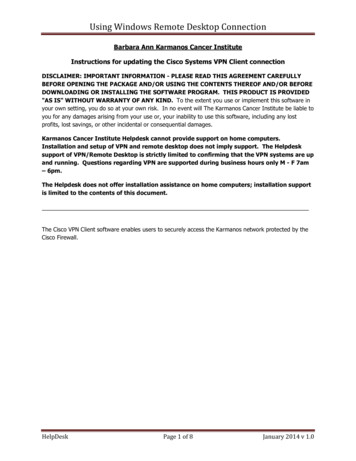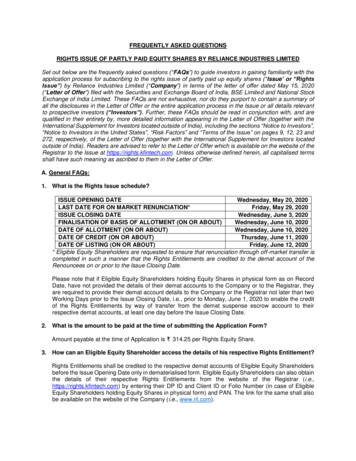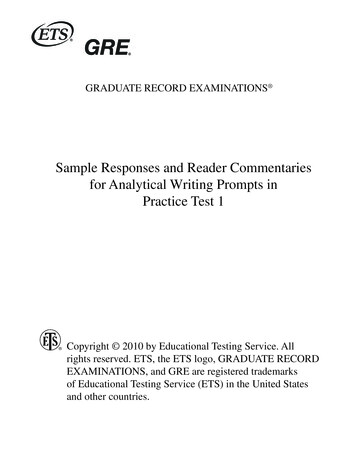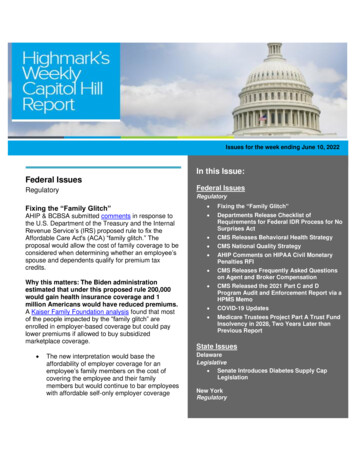
Transcription
Issues for the week ending June 10, 2022In this Issue:Federal IssuesRegulatoryFederal IssuesRegulatory Fixing the “Family Glitch”AHIP & BCBSA submitted comments in response tothe U.S. Department of the Treasury and the InternalRevenue Service’s (IRS) proposed rule to fix theAffordable Care Act's (ACA) “family glitch.” Theproposal would allow the cost of family coverage to beconsidered when determining whether an employee’sspouse and dependents qualify for premium taxcredits. Departments Release Checklist ofRequirements for Federal IDR Process for NoSurprises Act CMS Releases Behavioral Health Strategy CMS National Quality Strategy AHIP Comments on HIPAA Civil MonetaryPenalties RFI Why this matters: The Biden administrationestimated that under this proposed rule 200,000would gain health insurance coverage and 1million Americans would have reduced premiums.A Kaiser Family Foundation analysis found that mostof the people impacted by the “family glitch” areenrolled in employer-based coverage but could paylower premiums if allowed to buy subsidizedmarketplace coverage.CMS Releases Frequently Asked Questionson Agent and Broker Compensation CMS Released the 2021 Part C and DProgram Audit and Enforcement Report via aHPMS Memo COVID-19 Updates Medicare Trustees Project Part A Trust FundInsolvency in 2028, Two Years Later thanPrevious ReportFixing the “Family Glitch” The new interpretation would base theaffordability of employer coverage for anemployee’s family members on the cost ofcovering the employee and their familymembers but would continue to bar employeeswith affordable self-only employer coverageState IssuesDelawareLegislative Senate Introduces Diabetes Supply CapLegislationNew YorkRegulatory
from tax credit eligibility. Additionally, bothAHIP and BCBSA recommended changesrelated to the calculation of minimum value,and offered suggestions for a smoothimplementation of the proposed changes.Departments Release Checklist ofRequirements for Federal IDR ProcessThe Departments of the Treasury, Labor, and Healthand Human Services (Departments) releaseda checklist to help group health plans and group andindividual health insurance issuers comply withrequirements of the No Surprises Act (NSA). Thischecklist was released in response to questions andcomplaints the Departments received regarding planand issuer requirements. The checklist is not anexhaustive list of NSA requirements and focuses onthe requirement to process claims within 30-calendarday timeframe, the requirement to provide certaininformation in writing with each initial payment ornotice of denial of payment, open negotiation periodand Federal IDR Initiation.CMS is holding a training for plans and issuers on theNo Surprises Act Qualifying Payment Amount (QPA)calculation methodology and QPA audits on Monday,June 13, from 1-3 pm Eastern time. Visit theREGTAP registration page by Friday, June 10, at 1:00pm Eastern time to register for the training. Regulatory Update: COVID-19 EmergencyRegulations Extended; Maternity Report &Pharmacy RegulationsPennsylvaniaLegislative House and Senate Advance CHIP ChoiceLegislation Senate Health and Human ServicesCommittee Advance Pasteurized DonorHuman Milk Legislation House Insurance Committee Holds Meetingon Insurance Data Security Legislation Senate Committee Passes Childhood LeadTesting Legislation Supreme Court Committee Signaling It WillMove Forward with Proposal to ChangeVenue Rules in Medical Malpractice CasesIndustry TrendsPolicy / Market Trends FTC Launces Inquiry into Pharmacy BenefitManagers MACPAC Releases Issue Brief on LGBTMedicaid Beneficiaries Accessing Care HHS Resources on Infant Formula Shortage
CMS Releases Behavioral Health StrategyThe Centers for Medicare & Medicaid Services (CMS) released a behavioral health strategy that focuses onensuring that access, equity, quality and data integration are used in the prevention and treatment of mentalhealth and substance use disorders (SUD). The Behavioral Health Strategy consists of five interrelatedgoals: strengthening equity and quality in care; improving access to SUD care; ensuring effective paintreatment; improving access and quality of mental health care; and utilizing data to inform effective actionsand impact on behavioral health. The strategy supports the Administration’s efforts to address the nationalmental health crisis.CMS National Quality StrategyLeaders from the Centers for Medicare & Medicaid Services (CMS), Center for Clinical Standards andQuality published a blog post on the CMS National Quality Strategy and next steps for the first phase of thismulti-part approach. CMS will begin listening sessions in early summer 2022 to further collaboration withstakeholders to develop and operationalize short- and long-term actions. To ensure a unified approach theagency will also look to federal affiliates, external stakeholders, Quality Improvement Organizations, privatepayers, states and territories, and others to implement the goals outlined in the CMS National QualityStrategy. The success of this strategy relies on coordination, innovative thinking, and collaboration acrossall entities.In April CMS launched their eight goal National Quality Strategy to help create a more equitable, safe, andoutcome-based health care system for all individuals. The core goals of the strategy include: Embed Quality into the Care Journey Advance Health Equity Promote Safety Foster Engagement Strengthen Resiliency Embrace the Digital Age Incentivize Innovation and Technology Adoption to Drive Care Improvements Increasing AlignmentAHIP Comments on HIPAA Civil Monetary Penalties RFIAHIP submitted comments on the U.S. Department of Health and Human Services (HHS) Office for CivilRights (OCR) request for information (RFI) on security practices and the Health Information Technology forEconomic and Clinical Health (HITECH) Act.Why this matters: The RFI focuses on situations when OCR makes determinations regarding fines, audits,and remedies to resolve potential violations of the Health Insurance Portability and Accountability Act(HIPAA) Security Rule and the potential distribution of a percentage of civil money penalties (CMPs) ormonetary settlements to harmed individuals.
The comment letter highlights support for the goals of recent cybersecurity laws designed to addressthreats to electronic systems. AHIP also emphasized how health insurance providers implement physical,technical, and administrative safeguards to protect members’ personal information.As OCR considers potential regulation of security practices, AHIP’s comments focus on the following keythemes: How “recognized security practices” is defined.Public and private entities working together to share information on cyber threats.Exploring ways public and private entities can measure the effectiveness of security practices.Any OCR investigation or review should deem compliance when an entity uses good faith practices.Determining compensable harm with respect to HIPAA security violations should closely follow thestatutory language of the HITECH Act.AHIP’s full comment letter can be found here.CMS Releases Frequently Asked Questions (FAQs) on Agent and Broker CompensationThese FAQs address compensation paid by issuers to agents and brokers who assist consumers withenrollment during a Special Enrollment Period (SEP) or during Open Enrollment Periods (OEPs). Thedocument notes paying differential compensation to agents and brokers for coverage in the same benefityear based on whether the enrollment is completed during an SEP or during the OEP is prohibited underfederal law.CMS Released the 2021 Part C and D Program Audit and Enforcement Report via a HPMSMemoThis report provides information on the program audit process, a current snapshot of the program auditlandscape, a summary of the 2021 program audits, as well as CMS' enforcement actions. The report wasshared as an attachment to the HPMS memo but will eventually be uploaded here.COVID-19 Updates The Food and Drug Administration’s Vaccines and Related Biological Products Advisory Committee(VRBPAC) recommended that the FDA grant emergency use authorization (EUA) for the NovavaxCOVID-19 vaccine in adults by a vote of 21-0. The FDA is expected to make a decision on grantingNovavax an EUA soon. If approved the Centers for Disease Control and Prevention’s AdvisoryCommittee on Immunization Practices (ACIP) will meet to determine when and how the vaccineshould be administered. During a press briefing regarding the impending release of COVID-19 vaccines for children underfive, Dr. Ashish Jha, White House Coronavirus Response Coordinator, spoke publicly to the newsthat the Biden Administration will divert funds from public health programs to ensure the nextgeneration of vaccines are available for Americans in the fall and winter and to continue to acquire
therapeutics approved to fight COVID-19. Dr. Jha emphasized that, in addition, the White HouseCOVID Response Team is discussing the urgency of getting the necessary resources to continue toprotect the American people directly with Congress.Medicare Trustees Project Part A Trust Fund Insolvency in 2028, Two Years Later thanPrevious ReportMedicare trustees issued their annual report, including a projection that the Hospital Insurance (Part A)Trust Fund, which helps pay for services such as inpatient hospital care, would become insolvent in 2028,two years later than predicted in last year’s report. The report credited a stronger-than expected economyand increased tax revenue for extending the life of the trust fund. According to the trustees, the share ofMedicare Advantage payments coming from the Part A trust fund has declined from 52.3% in 2011 to42.1% in 2021 and is projected to continue falling to 37.9% by 2031. The trustees also issued a Medicarefunding warning, which is required when, for two years in a row, the trustees project the difference betweenMedicare’s total outlays and its dedicated financing sources to exceed 45 percent of outlays within 7 years.This is the fifth consecutive year such a warning has been triggered in the report.State IssuesDelawareLegislativeSenate Introduces Diabetes Supply Cap LegislationSenate Bill 316 caps the amount that an individual, group, or State employee plan may charge for diabetesequipment and supplies, other than insulin, at 35 per month. This cap does not apply to accident-only,specified disease, hospital indemnity, Medicare supplement, long-term care, disability income, or otherlimited benefit health insurance policies.State IssuesNew YorkRegulatoryCOVID-19 Emergency Regulations ExtendedThe Department of Financial Services (DFS) has once again extended the two emergency regulationsrelated to cost sharing for COVID-19 services: waving cost sharing for coronavirus testing and waiving costsharing for COVID-19 vaccines.Maternity Report
As required by a law signed last year, DFS, in consultation with DOH, must issue a report to the NYSlegislature by the end of the year on coverage for maternity care, including the scope of review of benefitsrelated to childbirth under commercial and Medicaid plans. DFS last week provided a draft 308 letter andspreadsheets that will be used to collect plan data on claims for calendar years 2019 and 2020 that will beused in the report.Pharmacy RegulationsTwo DFS proposed regulations were published in the June 8 State Register. The first, Registration ofPharmacy Benefit Managers, establishes regulations for the registration and first annual report of pharmacybenefit managers. The second relates to the Pharmacy Benefits Bureau within DFS, changing the name theOffice of Pharmacy Benefits to the Pharmacy Benefits Bureau and expanding its authority. Previouslycharged with conducting investigations with respect to prescription drugs, the Bureau’s responsibilities nowalso include the regulation of PBMs.State IssuesPennsylvaniaLegislativeHouse and Senate Advance CHIP Choice LegislationLast week, the House unanimously advanced House Bill 2585 (Pickett, R-Bradford) and the Senateunanimously advanced Senate Bill 1235 (DiSanto, R-Dauphin).This legislation would prohibit the Pennsylvania Department of Human Services from developing or utilizingbidding or service zones that limit a health service corporation or hospital plan corporation contractor fromsubmitting a bid for CHIP.House Bill 2585 was referred to the Senate Banking and Insurance Committee and Senate Bill 1235 wasreferred to the House Insurance committee, for consideration.Why this matters: Highmark expressed support for advancing this legislation, which would provide a pathfor certain CHIP families to maintain CHIP coverage without disruption.Senate Health and Human Services Committee Advance Pasteurized Donor Human MilkLegislationOn Tuesday, the Senate Health and Human Services Committee Advanced Senate Bill 1202 (Brooks, RMercer). Senate Bill 1202 would require health insurers to cover the use of medically prescribedpasteurized donor human milk (PDHM) in inpatient and outpatient settings for children under the age of 12months if the child's mother is medically or physically unable to produce maternal breast milk in an amountneeded to meet the child's needs.
Amendment A04462 (Brooks, R – Mercer) was offered to Senate Bill 1202 and unanimously adopted by thecommittee which specifies that inpatient reimbursement for human donor milk would be paid separatelyfrom a bundled payment.Highmark currently covers this service in an inpatient setting as part of a bundled payment for maternitycare. Highmark expressed concerns with mandating coverage for specific conditions in an outpatient settingand that PDHM should be prioritized for high-risk, low birthweight inpatient infants.House Insurance Committee Holds Meeting on Insurance Data Security LegislationThe House Insurance committee held an informational meeting on House Bill 2499.Why this matters: The legislation would amend Title 40 (Insurance), to propose the adoption of theNational Association of Insurance Commissioners (NAIC) model law requiring licensees to conduct anannual risk assessment. Further, this legislation would require each insurer domiciled in Pennsylvania to submit an annualwritten statement to the Pennsylvania Insurance Department certifying that the insurer is incompliance with the risk assessment, information security program, and oversight portions of theAct, and this legislation would require a licensee or an outside vendor and/or service provider toconduct a prompt investigation and notify the Commissioner of the Pennsylvania InsuranceDepartment within three (3) business days from a determination that a cybersecurity event involvingnonpublic information in the possession of the licensee has occurred.David Buono, deputy insurance commissioner, Office of Market Regulation, Pennsylvania InsuranceDepartment (PID), described cybercrime as one of the "greatest threats" consumers and businesses workto prevent. He expressed support for establishing "uniformity" for the country's cyber security laws byutilizing a model law. He delineated how insurance providers must provide notification of cyber attacks ordata breaches to the proper authorities.Laura Rieben, deputy privacy officer, Internal Audit and Compliance Department, Independence BlueCross, testified that IBC supports House Bill 2499. She explained the bill requires notification based on thedetermination one individual may likely be impacted, in contrast to federal Health Insurance Portability andAccountability Act (HIPAA) standards that set a threshold based on the size of an impacted population. Sheadded HIPAA standards allows 60 days following the discovery of a breach to notify a federal regulator forpopulations with more than 500 individuals, and 60 days following the end of the calendar year for caseswith fewer than 500 individuals.Senate Committee Passes Childhood Lead Testing LegislationThe Senate Appropriations Committee unanimously passed SB 522, which provides for blood lead testingof certain children and pregnant women by health care providers; imposes duties on the Department ofHealth; and requires certain health insurance policies to cover blood lead tests.Sen. Lisa Baker (R-Luzerne), the bill's prime sponsor, thanked the committee for advancing Senate Bill 522and noted the bipartisan legislation will "increase awareness, assessment and testing to detect leadpoisoning in our children." She noted a floor amendment is anticipated.
Pennsylvania Supreme Court Committee Signaling It Will Move Forward with Proposal toChange Venue Rules in Medical Malpractice CasesThe Civil Procedural Rules Committee is planning to propose to the Supreme Court of Pennsylvaniachanges to the procedural rules regarding venue in medical malpractice actions. The proposed change,detailed in a notice published in the December 22, 2018 Pennsylvania Bulletin, would revive the venue rulesthat largely created PA's severe medical malpractice insurance crisis.Background: Prior to 2003, Pennsylvania’s loose venue rules allowed medical malpractice plaintiffs to suedefendants almost anywhere they did business, even if the alleged malpractice occurred elsewhere. Theresult was that the vast majority of PA malpractice cases were filed in Philadelphia, Allegheny County, anda couple other pro-plaintiff counties.In 2003, with insurance options limited and premiums soaring, the PA Supreme Court amended the venuerules to require the filing of medical malpractice cases only in the county where the alleged malpracticeoccurred (Pa.R.Civ.P 1006(a.1)). This amendment, which was the most important of the reform efforts thataddressed the insurance crisis, reduced medical malpractice filings in PA by 40%, from about 2,500 casesper year to 1,500 cases per year.Now, the Civil Procedural Rules Committee is proposing to ask the Supreme Court to consider a proposalto rescind the venue reform and restore the prior venue rules. This change is being proposed on the theorythat the insurance crisis is over and medical malpractice defendants are no longer entitled to specialtreatment.Legislative action: In 2002, Pennsylvania’s governor, General Assembly and Supreme Court workedtogether to end venue shopping. That same approach is not present so a bid to amend Pennsylvania’sconstitution to stop the return of venue shopping in medical malpractice liability cases is underway in theGeneral Assembly.State Representative Rob Kauffman (R-Franklin) has introduced House Bill 2660, which would begin theprocess of amending the state constitution to allow the General Assembly to establish the venue of civillawsuits and prevent venue shopping. To amend the state constitution, lawmakers must pass identicalresolutions in back-to-back legislative sessions. The amendment is then put to a public vote as a statewideballot question.Industry TrendsPolicy / Market TrendsFTC Launches Inquiry into Pharmacy Benefit ManagersThe Federal Trade Commission announced it will launch an investigation into Pharmacy Benefits Managers(PBMs).
Why this matters: As part of the investigation the six largest PBMs will be required to provide informationto the FTC on their business practices. The aim of the investigation is to analyze the impact of verticallyintegrated PBMs on access and affordability of prescription drugs.The FTC voted 5-0 to issue the investigation under Section 6(b) of the FTC Act, which allows the FTC toconduct studies without a specific law enforcement purpose. CVS Caremark, Express Scripts, OptumRx.,Humana, Prime Therapeutics, and MedImpact Healthcare Systems were identified in the press release andwill have 90 days from the date they are contacted to respond.Specifically, the inquiry will aim to shed light on several practices: fees and clawbacks charged to unaffiliated pharmacies methods to steer patients towards pharmacy benefit manager-owned pharmacies potentially unfair audits of independent pharmacies methods to determine pharmacy reimbursement the prevalence of prior authorizations the use of specialty drug lists and surrounding specialty drug policies the impact of rebates and fees from drug manufacturers on formulary design and the costs ofprescription drugs to payers and patientsLast month, AHIP submitted comments to the FTC on PBM business practices, highlighting insurers’ sharedcommitment to more affordable prescription drugs, and detailing how health insurance providers and PBMsuse their bargaining power to negotiate savings for millions of Americans.MACPAC Releases Issue Brief on LGBT Medicaid Beneficiaries Accessing CareThe Medicaid and CHIP Payment and Access Commission (MACPAC) published an issue brief which foundthat the majority of lesbian, gay, and bisexual adults on Medicaid had a usual source of care and similarrates of physical health care service use as heterosexual adults on Medicaid. However, these adults weresignificantly more likely to report not having received necessary behavioral health or alcohol and drugtreatment in the past 12 months. Medicaid-covered transgender and gender-diverse adults reported similarrates of access to providers for both routine and most gender-affirming health care as those covered byprivate insurance, but those covered by Medicaid were more likely to report not being able to find in-networkproviders for gender affirming surgery. Read MoreHHS Resources on Infant Formula ShortageThe Department of Health and Human Services (HHS) has created a resource for families on how tomanage their needs during the ongoing infant formula shortage, including finding substitutes and safefeeding practices. Most recently, they released an infographic with a conversion chart for convertingmilliliters to fluid ounces among other common conversions. Last week, the Food and Drug Administration(FDA) also provided an update on incoming formula supplies. New formula from Nestlé (Mexico) isexpected beginning in July.
Interested in reviewing a copy of a bill(s)? Access the following web sites:Delaware State Legislation: http://legis.delaware.gov/.New York Legislation: https://nyassembly.gov/leg/Pennsylvania Legislation: www.legis.state.pa.us.West Virginia Legislation: http://www.legis.state.wv.us/For copies of congressional bills, access the Thomas website – http://thomas.loc.gov/.The content of this email is confidential and intended for the recipient specified only. It is strictly forbidden to shareany part of this message with any third party, without a written consent of the sender. If you received this messageby mistake, please reply to this message and follow with its deletion, so that we can ensure such a mistake does notoccur in the future.
specified disease, hospital indemnity, Medicare supplement, long-term care, disability income, or other limited benefit health insurance policies. State Issues . New York . Regulatory . COVID-19 Emergency Regulations Extended . The Department of Financial Services (DFS) has once again extended the two emergency regulations



